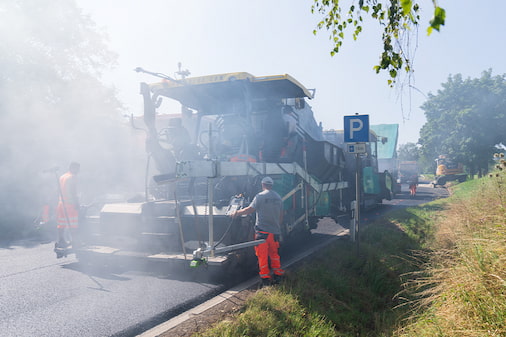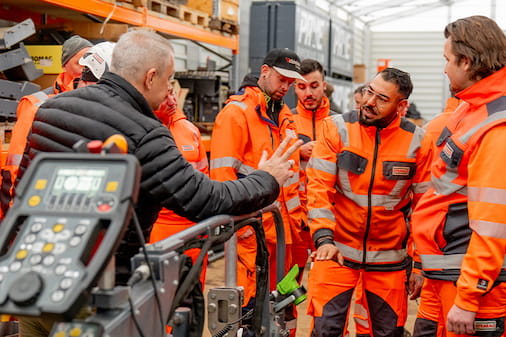
QSBW 4.0: the handbook for digital asphalt construction
With QSBW 4.0, digital road construction is being introduced to public sector projects in Baden-Württemberg. The aim is to increase the efficiency and quality of the work. Among other things, this should shorten closure times and increase the service life of the asphalt. However, sustainability should also benefit from digitalisation. Our guest Dr Marcus Müller explained to us in the podcast what this means in detail for contractors and what opportunities and challenges it presents for small construction companies.
The expert interview on QSBW 4.0
With QSBW 4.0, digitalisation has finally arrived in road construction. Dr Marcus Müller told us what this means in practice and how contractors can implement the manual’s requirements in their company.
The first step is always the most difficult
QSBW 4.0 introduces numerous innovations in the implementation of maintenance measures, such as the networking of construction machinery and vehicles with each other or the documentation of the paving temperature in real time. Dr Müller considers two things to be particularly important for the successful implementation of these innovations.
Construction companies should not try to implement the entire technology bundle all at once in their day-to-day work; instead, the expert advises a gradual introduction. However, what has been implemented once should then also be used on every construction site, not just when the tender requires it. This is the only way for companies and their employees to develop the necessary routine, explains Müller.

How smaller companies are mastering QSBW 4.0
Digitalisation requires new technology and employee training. The challenges may seem great at first, especially for small companies, but here too Müller advises a step-by-step approach. ‘In many cases, small-scale digitalisation can already help in the normal day-to-day running of a company and at some point you’ll be confident enough to do the QSBW things off the top of your head,’ says the expert. When it comes to digitalisation, companies should not only see the end goal, but above all the journey and simply take the first step.
QSBW 4.0 requires investment in people and materials
But even if a company takes small steps on the path to digitalisation, it cannot avoid making investments. Hardware and software solutions have to be provided and employees have to be trained in how to use them. Of course, this also means additional costs for the client. However, these are partially offset by longer delivery times and other benefits.
Marcus Müller believes that the cost factors for the contractors are easy to calculate. The human factor can be a different story. Companies need to show their employees the opportunities offered by digitalisation and provide them with the best possible training for their new tasks. After all, there are plenty of uncertainties.
Get ready for the future of road construction
Would you like to find out more about what modern asphalt applications can look like? Do you want to use the winter break to refresh your knowledge? Do you want to familiarise your new employees with the basics of road construction?
Then secure access to our online training course for asphalt applications now!
Does QSBW 4.0 mean total monitoring of contractors?
One concern that affects not only the construction industry, but digitalisation in general, is the fear of total surveillance. Many fear that clients will meticulously monitor their contractors and that companies will in turn monitor every single employee.
Müller believes that management has a duty to prevent this from happening. Although digital technology shows many errors in real time, it is important not to fall into the trap of only controlling all processes from the office. Both clients and contractors must continue to be present on construction sites and talk to employees on site in the event of problems. Otherwise, digitalisation is doomed to failure from the outset, the expert believes.

Will digitalisation in road construction destroy jobs?
In addition to the fear of surveillance, it is above all the concern about jobs that is also associated with digitalisation in road construction. But here, too, our guest is calm about the future: ‘There is still work, there is even more work,’ says Müller. There will not be less demand for labour, only a change in tasks. Unpleasant and boring activities in particular will increasingly be replaced by other tasks.
More sustainability with QSBW 4.0
Road construction cannot ignore the issue of sustainability. Sustainability criteria are now a central component of public sector tenders. However, Müller believes that sustainability and digitalisation should not be viewed separately, but rather go hand in hand, for example when it comes to compliance with and monitoring of sustainability criteria.
“There is almost no other option than to do this digitally. The link between the major social issue of sustainability, which is also increasingly driving the construction industry, and digitalisation: that will be the future,” Marcus Müller is certain.
The perfect introduction for new employees
Want to learn all about asphalt applications and modern road construction from experts? Then secure access to our exclusive training content now to refresh your knowledge.


 DEUTSCH
DEUTSCH
